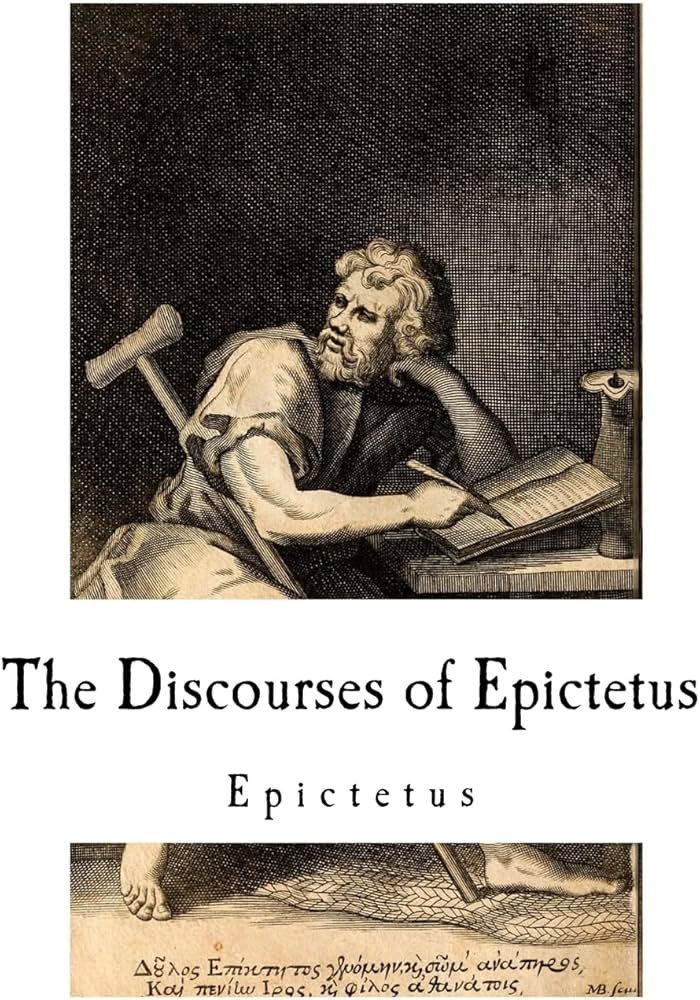The Sword of Reason: Stoicism without Sentiment
Table of Contents
A Slave’s Wisdom, A Philosopher’s Voice
Epictetus was born into slavery in the Roman Empire, yet rose—by intellect, character, and unshakable integrity—to become one of the most respected Stoic philosophers of antiquity. He never wrote his teachings down. The Discourses come to us thanks to his student Arrian, who transcribed them much like one would a Socratic dialogue or lecture series.
This fact alone imbues the Discourses with a sense of immediacy. They are not polished treatises. They are unfiltered spiritual instruction — gritty, impassioned, urgent — aimed at shaping the reader’s soul, not their bookshelf.
Content and Style: Philosophy as Combat Training
The Discourses are broken into four books, each containing roughly 25–30 sections (or “discourses”), ranging in length from a paragraph to several pages. Each one begins with a scenario, question, or criticism — and Epictetus responds with verbal judo: parables, analogies, counterarguments, and rhetorical fire.
Unlike Seneca’s warm companionship or Marcus Aurelius’ introspective pondering, Epictetus is confrontational. Not hostile — but demanding. He assumes the student is morally asleep, and his job is to shake them awake.
“You are not a slave to anyone except to yourself.”
He dissects human folly: complaining, hoping for control, fearing death, grasping at externals. His chief distinction is between what is “up to us” (our judgments, choices, desires) and what is “not up to us” (everything else).
“Seek not that events should happen as you wish, but wish them to happen as they do — and your life will go smoothly.”
The Stoic ideal in Epictetus is a kind of moral invincibility — the person who, by disciplining their perceptions and desires, becomes unshaken by fortune, insult, illness, or death.
Core Themes
- Dichotomy of Control: The foundation of Epictetus’ thought. Master only what is yours — your will and judgments — and be indifferent to all else.
- Role Ethics: We are all born into roles (child, citizen, spouse). Excellence lies in playing each role rightly, not escaping them.
- Moral Education: Philosophy is not theory. It is a craft of life, requiring rigorous practice.
- Self-Mastery: You are your own tyrant or liberator. Discipline your thoughts, and no one can enslave you.
- Providence over Chance: The Stoic cosmos is orderly. Events happen with meaning — if not to benefit us, then to train us.
Strengths and Limitations
Strengths:
- Extreme Clarity: Epictetus’ dichotomy of control is a razor-sharp conceptual tool.
- Practical Toughness: No vague speculation — only moral application.
- High Consistency: His system is clear and logically coherent throughout.
- Motivational Force: His teachings are galvanizing — they demand action.
Limitations:
- Minimal Warmth: Some readers find his tone too austere or severe.
- Repetitive Structure: Many discourses hammer the same dichotomy from different angles.
- Less Literary: Compared to Seneca or Marcus, his prose is blunt and functional — not poetic.
- Lack of Systematic Order: The lectures were transcribed, not organized by theme, so the reader must assemble the doctrine for themselves.
But these traits are part of the Discourses’ power. They’re not meant to be read passively. They’re meant to train your inner soldier.
What Makes It Special
If Meditations is a diary and Letters are a mentor’s reflections, the Discourses are a dojo. There is no room for self-pity. Epictetus calls the student to rise — immediately — and live as if reason were divine fire.
What makes the Discourses unique is how uncompromising they are. He refuses to flatter the reader. He ridicules excuses. He exposes weakness. Yet at the core of it all is dignity — an unbreakable faith in human rationality and moral capacity.
His image of the Stoic is not one of gentleness, but moral strength: someone who could lose everything and remain cheerful, someone who would rather die than be dishonest. In an age of passive intellectualism, his tone is refreshing — even radical.
How It Compares
- Compared to Marcus Aurelius: Marcus is meditative and poetic; Epictetus is confrontational and logical.
- Compared to Seneca: Seneca blends Stoicism with rhetorical elegance; Epictetus is a hammer — striking until the soul is forged.
- Compared to modern texts: Epictetus is the closest ancient equivalent to a Stoic drill instructor — a blend of Socrates, a cognitive therapist, and a Zen master.
Who Should Read It
- Those seeking clear, principle-based philosophy
- Readers ready for moral challenge, not comfort
- Anyone drawn to Stoicism as a way of overcoming internal chaos
- Students of philosophy or cognitive therapy who want source-level rigor
This is not a beginner’s bedtime read — but if you’re willing to wrestle with yourself, Discourses may become a lifelong guide.
Final Thoughts
Discourses is not a book for collecting quotes. It is a crucible. Epictetus does not want you to admire him. He wants you to become what you are capable of being — a sovereign soul, clear-eyed and unafraid.
Read it not to feel good, but to become good — a person who walks through chaos as if led by truth itself.
TL;DR
| Category | Details |
|---|---|
| Author | Epictetus (recorded by Arrian) |
| Method | Four books of oral teachings transcribed into dialogues |
| Structure | Short discourses (~100) each tackling a moral dilemma or concept |
| Skill Level | Intermediate to Advanced; demands active engagement |
| Teaching Style | Direct, challenging, dialogic |
| Strengths | Logical clarity, moral toughness, practical transformation |
| Challenges | Austere tone, repetition, less literary richness |
| Best For | Students of Stoicism, philosophy, personal mastery, cognitive discipline |
| Companions | Enchiridion (summary text), Marcus Aurelius’ Meditations, Seneca’s works |
| Verdict | A razor-edged manual for moral transformation, forged in real-world hardship |

Leave a Reply